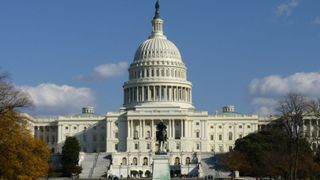FCC Reauthorization Bill Bulks Up

The FCC reauthorization bill being marked up Wednesday (Feb. 14) in the House Energy & Commerce Committee has gone through a number of changes and additions since being unanimously voted out of subcommittee back in October with the understanding that the harder work would come in the full committee markup.
That's according to a summary of the new bill, which will be introduced as a substitute amendment. The last time the FCC was reauthorized was in 1990. Reauthorization defines the rules and priorities of an agency, and is an opportunity to change those rules and priorities.
The current bill's proposed changes include: removing the Removed Amateur Radio Parity Act; removing two provisions that passed both House and Senate as stand-alone bills in the interim--Kari’s Law and the Rural Call Quality and Reliability Act; replacing an interagency communications security committee with a National Telecommunications & Information Administration study; adding the extra money for the post-incentive auction TV station repack; adding a "tribal digital access" section; adding the noncommercial exception to regulatory and application fees; and a number of technical changes.
Importantly, the bill also clears up an issue with FCC's deposit of auction proceeds that could have held up any future spectrum auctions. That incorporates a fix proposed by Rep. Doris Matsui (D-Calif.). This removes a critical hurdle the FCC identified, which prevents financial institutions from holding large sums from auction deposits put up by spectrum auction bidders," said Robert McDowell, chief public policy advisor of Mobile Future.
Related: MOBILE Now Act Not on FCC Reauthorization Bill
Below is a Title-by-Title look at the bill:
Title I: Reauthorizes the FCC and freezes its budget at $322 million. The FCC pays for its operations through regulatory fees paid by licensees, which it must review and adjust every two years.
The FCC last May asked for $322 million for 2018, 5.2% less than the previous year, even though the FCC's budget has been flat since 2009.
FCC chair Ajit Pai has said the commission can do more with less—102 fewer full-time employees, for example— while working toward its core mission to protect the public interest and close the digital divide.
Title II: Incorporates a variety of transparency and efficiency reforms including posting documents under review on the FCC's website and circulating items 21 days in advance of any action on those items, something Pai has been doing without a congressional mandate.
Title III: The FCC has to report on the cost of making WiFi access available to the public in an emergency and alternate means of providing 911 services in emergencies, changes driven by Rep. Frank Pallone's SANDY Act.
Title IV: Streamlines reporting requirements and consolidates redundant reports, incorporating Rep. Steve Scalise's (R-La.) FCC Consolidated Reporting Act.
Title V: Incorporates a host of other bills, according to the summary:
Sec. 501 – Establishes an independent Inspector General for FCC. (Rep. Bill Johnson, H.R. 2636)
Sec. 502 – Elevates the Chief Information Officer of the FCC and gives the CIO authority to play a significant role in planning, budgeting, and programming of the Commission. (Rep. Mimi Walters, H.R. 2546)
Sec. 503 – Amends the Communications Act to prohibit spoofing calls or texts originating outside the U.S., puts an 18-month shot-clock on the FCC to conduct a rulemaking, requires the FCC to work with the FTC to educate consumers on identifying spoofed calls, and directs GAO to conduct a study on fraudulent, misleading, or inaccurate caller ID info. (Rep. Grace Meng, H.R. 423)
Sec. 504 – Requires the FCC to submit a report to Congress on its efforts to promote BIAS for veterans, especially low-income veterans and/or those who reside in rural areas. (114th Congress, Rep. McNerney, H.R. 6394)
Sec. 505 – Requires the Commission to establish a methodology for collection of mobile service coverage. (Sen. Wicker, S. 1621)
Sec. 506 – Requires the FCC to conclude a proceeding within 18 months that call location information is conveyed with a 911 call, regardless of the technological platform used; including MLTS systems. (114th Congress, Rep. Anna Eshoo, H.R. 5236)
Sec. 507 – Requires a NTIA study to consider how the agency can best coordinate the interagency process following cybersecurity incidents. (Rep. Eliot Engel)
Sec. 508 – Requires the FCC to submit a report to Congress evaluating broadband coverage on tribal lands and carry out a rulemaking to address unserved tribal areas. (Rep. Raul Ruiz)
Title VI: Authorizes funds to pay repacking costs for full power, translator, low-power, and radio stations. Establishes a fund the FCC may use for consumer education relating to the repacking process.
Broadcasting & Cable Newsletter
The smarter way to stay on top of broadcasting and cable industry. Sign up below
Contributing editor John Eggerton has been an editor and/or writer on media regulation, legislation and policy for over four decades, including covering the FCC, FTC, Congress, the major media trade associations, and the federal courts. In addition to Multichannel News and Broadcasting + Cable, his work has appeared in Radio World, TV Technology, TV Fax, This Week in Consumer Electronics, Variety and the Encyclopedia Britannica.

